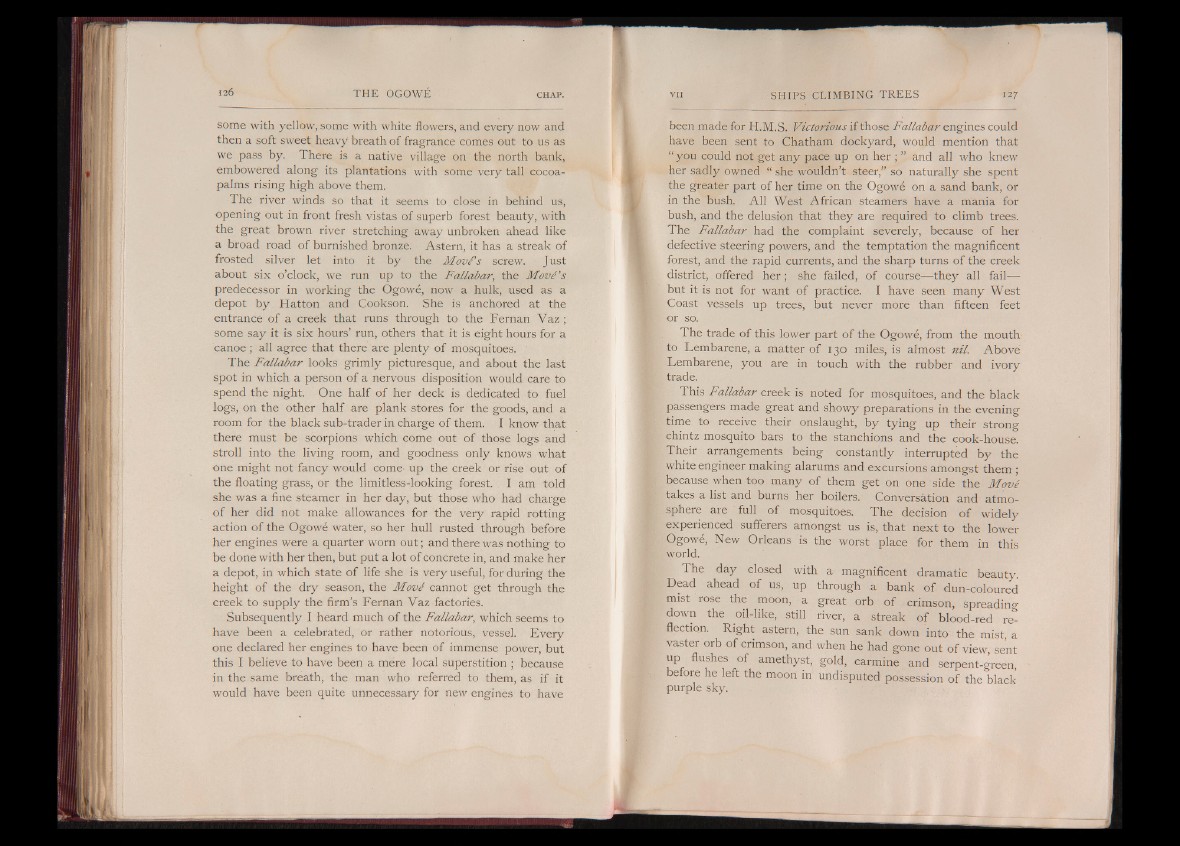
some with yellow, some with white flowers, and every now and
then a soft sweet heavy breath of fragrance comes out to us as
we pass by. There is a native village on the north bank,
embowered along its plantations with some very tall cocoa-
palms rising high above them.
The river winds so that it seems to close in behind us,
opening out in front fresh vistas of superb forest beauty, with
the great brown river stretching away unbroken ahead like
a broad road of burnished bronze. Astern, it has a streak of
frosted silver let into it by the Mové’s screw. Just
about six o’clock, we run up to the Fallabar, the Mové’s
predecessor in working the Ogowé, now a hulk, used as a
depot by Hatton and Cookson. She is anchored at the
entrance of a creek that runs through to the Fernán V a z ;
some say it is six hours’ run, others that it is eight hours for a
canoe ; all agree that there are plenty of mosquitoes. 1
The Fallabar looks grimly picturesque, and about the last
spot in which a person of a nervous disposition would care to
spend the night. One half of her deck is dedicated to fuel
logs, on the other half are plank stores for the goods, and a
room for the black sub-trader in charge of them. I know that
there must be scorpions which come out of those logs and
stroll into the living room, and goodness only knows what
one might not fancy would come up the creek or rise out of
the floating grass, or the limitless-looking forest. I am told
she was a fine steamer in her day, but those who had charge
of her did not make allowances for the very rapid rotting
action of the Ogowé water, so her hull rusted through before
her engines were a quarter worn out; and there was nothing to
be done with her then, but put a lot of concrete in, and make her
a depot, in which state of life she is very useful, for during the
height of the dry season, the Mové cannot get through the
creek to supply the firm’s Fernán Vaz factories.
Subsequently I heard much of the Fallabar, which seems to
have been a celebrated, or rather notorious, vessel. Every
one declared her engines to have been of immense power, but
this I believe to have been a mere local superstition ; because
in the same breath, the man who referred to them, as if it
would have been quite unnecessary for new engines to have
been made for H.M.S. Victorious if those Fallabar engines could
have been sent to Chatham dockyard, would mention that
I you could not get any pace up on her ; ” and all who knew
her sadly owned I she wouldn’t steer,” so naturally she spent
the greater part of her time on the Ogowe on a sand bank, or
in the bush. All West African steamers have a mania for
bush, and the delusion that they are required to climb trees.
The Fallabar had the complaint severely, because of her
defective steering powers, and the temptation the magnificent
forest, and the rapid currents, and the sharp turns of the creek
district, offered h e r ; she failed, of course— they all fail—
but it is not for want of practice. I have seen many West
Coast vessels up trees, but never more than fifteen feet
or so.
The trade of this lower part of the Ogowe, from the mouth
to Lembarene, a matter of 130 miles, is almost nil. Above
Lembarene, you are in touch with the rubber and ivory
trade.
This Fallabar creek is noted' for mosquitoes, and the black
passengers made great and showy preparations in the evening
time to receive their onslaught, by tying up their strong
chintz mosquito bars to the stanchions and the cook-house.
Their arrangements being constantly interrupted by the
white engineer making alarums and excursions amongst them ;
because when too many of them get on one side the Move
takes a list and burns her boilers. Conversation and atmosphere
are full of mosquitoes. The decision of widely
experienced sufferers amongst us is, that next to the lower
Ogowe, New Orleans is the worst place for them in this
world.
The day closed with a magnificent dramatic beauty.
Dead ahead of us, up through a bank of dun-coloured
mist rose the moon, a great orb of crimson, spreading
down the oil-like, still river, a streak of blood-red reflection.
Right astern, the sun sank down into the mist a
vaster orb of crimson, and when he had gone out of view, sent
up flushes of amethyst, gold, carmine and serpent-green,
; before he left the moon in undisputed possession of the black
purple sky.